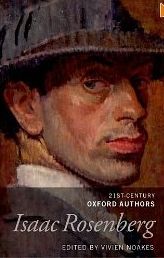Reilly 279.
Illustrated
Incription that reads "To Miss hayland, With my kindest wishes for her futher health and happiness. Aug 6th 1937 Babette Wedlake"
"Edited by D.W. Harding and Gordon Bottomley, with a foreword by Siegfried Sassoon" -- title page
Isaac Rosenberg (25 November 1890 – 1 April 1918) was an English poet of the First World War who was considered to be one of the greatest of all English war poets. His "Poems from the Trenches" are recognised as some of the most outstanding written during the First World War.
Isaac Rosenberg was born in Bristol in 1890 to Barnet and Annie Rosenberg, who had fled Devinsk in Lithuania to escape anti-Jewish pogroms. In 1897 the family moved to 47 Cable Street in a poor district of the East End of London, and one with a strong Jewish community. He attended St. Paul's School around the corner in Wellclose Square, until his family (of Russian descent) moved to Stepney in 1900, so he could experience Jewish schooling. He left school at the age of fourteen and became an apprentice engraver.
He was interested in both poetry and visual art, and managed to find the finances to attend the Slade School. During his time at Slade School, Rosenberg notably studied alongside David Bomberg, Mark Gertler, Stanley Spencer, Paul Nash, Edward Wadsworth and Dora Carrington. He was taken up by Laurence Binyon and Edward Marsh, and began to write poetry seriously, but he suffered from ill-health.
Suffering from chronic bronchitis, which he was afraid would only worsen, Rosenberg hoped to try and cure himself by emigrating to the warmer climate of South Africa, where his sister Mina lived.
He wrote the poem On Receiving News of the War in Cape Town, South Africa. While others wrote about war as patriotic sacrifice, Rosenberg was critical of the war from its onset. However, in order to find a "job" and be able to help support his mother, Rosenberg returned to England in October 1915 and enlisted in the army. He was assigned to the 12th Suffolk Folk Regiment, a 'bantam' battalion (men under 5'3"). After turning down an offer to become a lance corporal, Private Rosenberg was later transferred to the 11th Battalion, The King's Own Royal Lancaster Regiment (KORL). He was sent to the Somme on the Western Front in France where, having just finished night patrol, he was killed at dawn on April 1, 1918; there is a dispute as to whether his death occurred at the hands of a sniper or in close combat. In either case, Fampoux is the name of the town where he died. He was first buried in a mass grave, but in 1926, his remains were identified and reinterred, not in England, but at Bailleul Road East Cemetery, Plot V, St. Laurent-Blangy, Pas de Calais, France.
--Wikipedia
